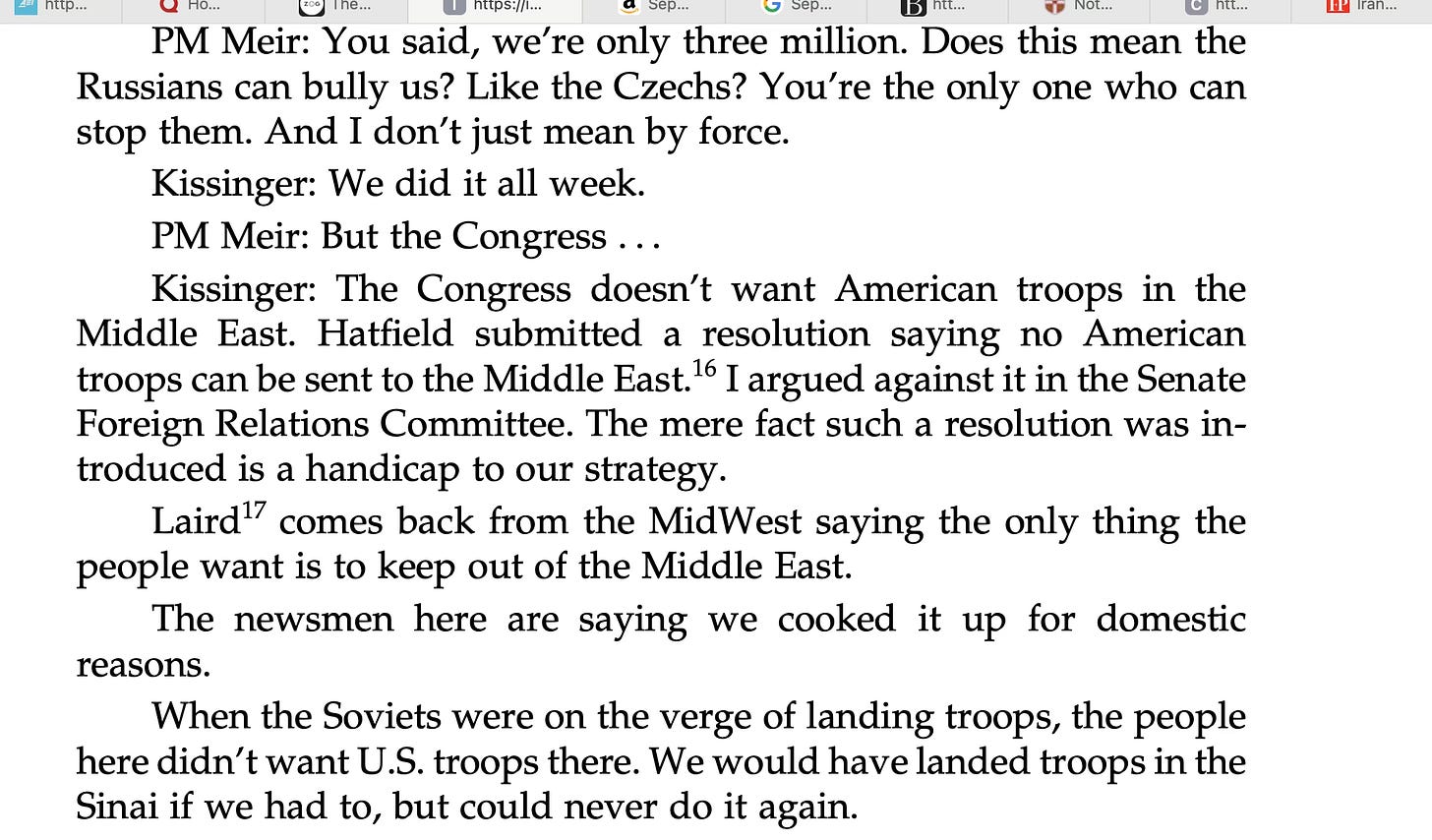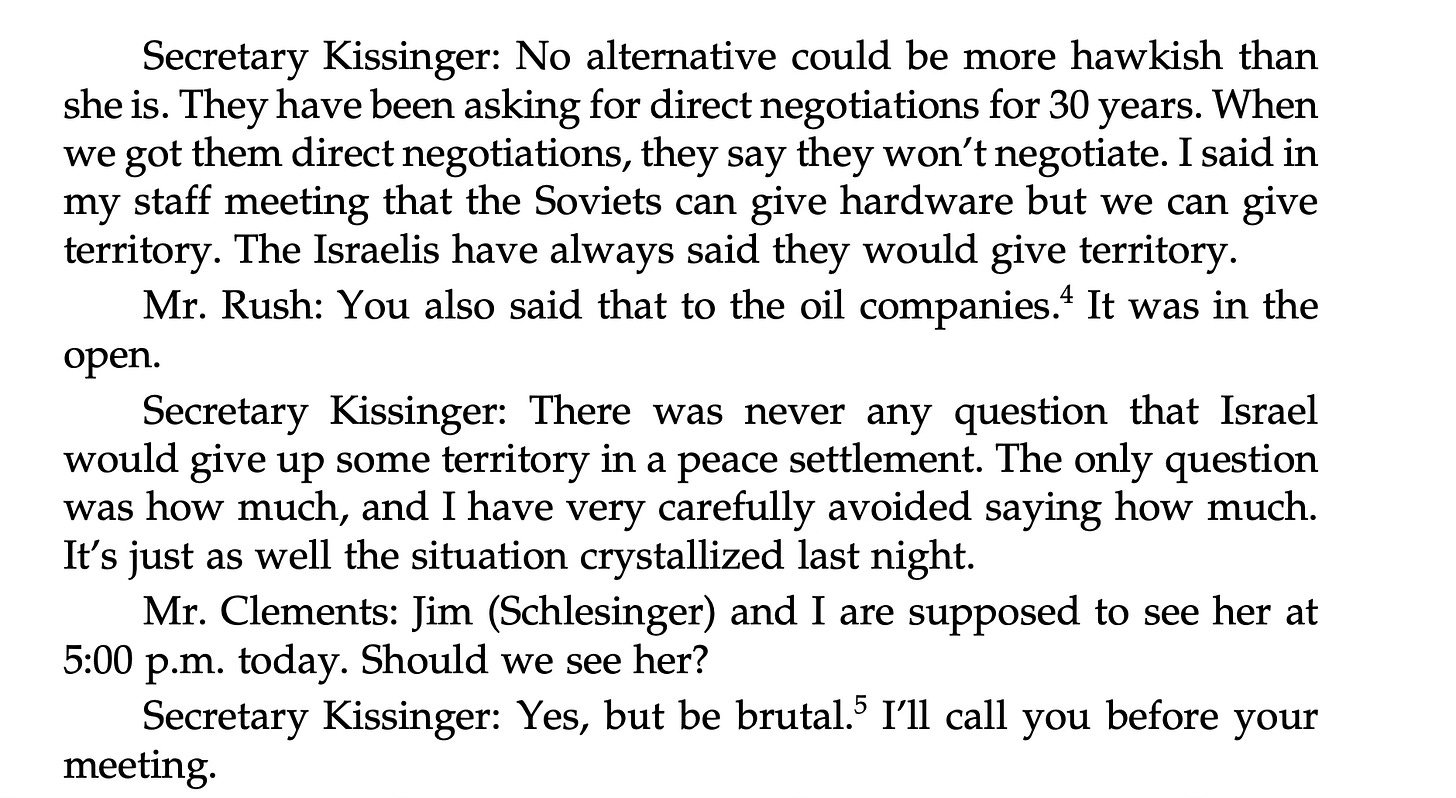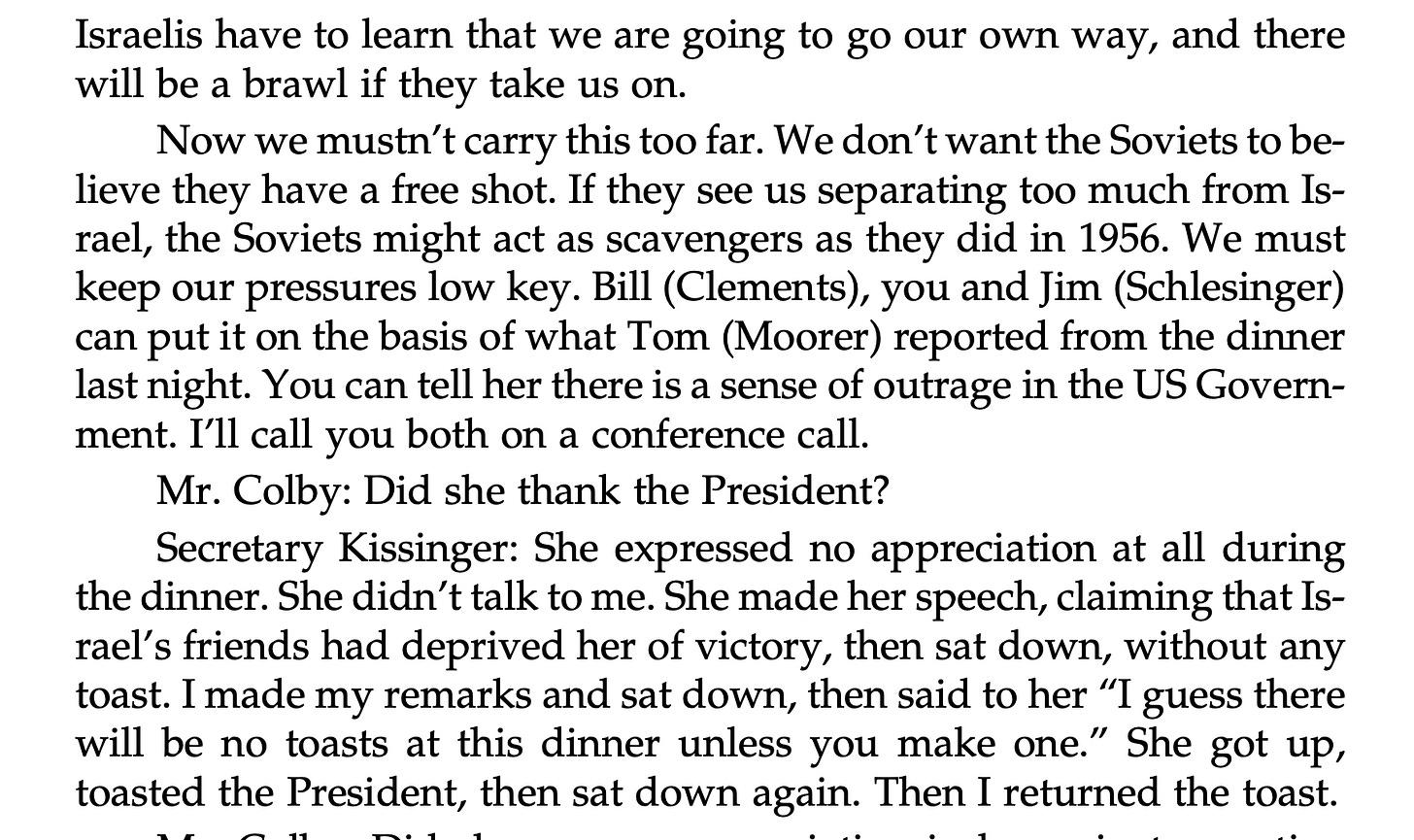
Mea culpa, mea maxima culpa. I should have sent this out in the beginning of the week.
I know it’s too late for you to read through this whole list by Sunday. So here’s what I suggest. I think you’ll find the reading especially interesting. The Yom Kippur war begins to take us into the present, even more so than the Six Day War. It also raises many of the questions Israelis once again find themselves asking now. We begin to get contemporary news footage, which I find especially interesting. This is a complex time in the Cold War, too, and there’s a lot going on in the Arab world, and in Jordan especially. It’s worth two weeks.
So read as much of this as you can by Sunday, without stress, and have a quick look, at least, at everything on the list. Then, on Sunday, we’ll see what you’ve had time to read, and we’ll decide together what to prioritize for the next week. Does that work for everyone?
I’m sorry, again, for being so dilatory with this. I just didn’t get it done in time, and I apologize.
Reading
The Rogers’ Plan, the War of Attrition, and Black September:
Robert J. Pranger, American Policy for Peace in the Middle East 1969-1971: Problems of Principle, Maneuver and Time.
Fifty Years After “Black September” in Jordan, by Bruce Riedel
I couldn’t find a free copy of Black September: It’s Short, Violent History, and it doesn’t seem to be in print anymore, either. But here’s an online library from which you can check it out. I’m not sure whether you can all check it out at the same time, however. If you can’t, I’ll find another book, but I really hope you can, because it’s a complete page-turner. Read only the parts that interest you: Where he covers ground we’ve already covered, feel free to skim—though I think you’ll find those interesting, too.
On the Yom Kippur War:
Israel’s 1973 October War: A 50-year perspective, a brief overview by Itamar Rabinovich: (Michael Oren also recommended his book about the war as the best single volume you can read, so put that on the list of “optional reading.”)
The Real Lessons of the Yom Kippur War (If you need a PDF, I’ll upload one to our Google Drive.)
Trial by Ordeal: The Yom Kippur War, October 1973, by Nadav Safran. If you have a JSTOR pass, you get 100 free articles a year. (If you’ve used all of yours already, tell me and I’ll send you a PDF.)
Intelligence Failure or Paralysis? by Amnon Lord. (Same deal as above.)
Foreign Relations of The United States 1969–1976, Volume XXV: Arab-Israeli Crisis And War, 1973. This is a complete archival history of the war from the US perspective. It’s more than 1200 pages, but don’t be intimidated. It’s in a big font, there’s a long bibliography, and you don’t have to read every page. Just read what interests you. It will all interest you. You’ll feel like you’re in the room with Kissinger and Gold Meir. (I just lost an hour getting sucked into it.)
Don’t worry about reading every last document. Just go through it and really get a feeling for what these negotiations were like and what they probably are like, right now.
Ideally, you’d read these alongside Kissinger’s White House Years, Nixon’s Memoirs, and Golda Meir’s My Life. All of these memoirs are great. You won’t have time to read them immediately, I assume, but make sure to read them before you die: They’re surprisingly good.
Study questions
What were Egypt’s strategic objectives in initiating the War of Attrition? How did these reflect Egypt’s broader foreign policy goals?
What roles did the United States and the Soviet Union play in the War of Attrition, and how did their involvement shape the war’s conduct and outcome?
What were the regional implications of Black September? What impact did the Jordanian civil war have on intra-Arab relations, especially between Jordan and its neighbors?
How did the presence and activities of the PLO in Jordan contribute to the outbreak of the civil war? Assess the PLO’s strategic miscalculations.
Why did Syria intervene? What were the consequences of Syria’s intervention?
Evaluate the effectiveness of the Egyptian and Syrian surprise attack in the Yom Kippur War. How did it defy Israel’s military and intelligence assumptions?
Enumerate the strategic and tactical shifts that enabled Israel to turn the tide in the Yom Kippur War. What lessons did Israel learn (if any)?
Assess the superpowers’ diplomatic maneuvers during the war. Does this episode suggest the limitations of superpower intervention in regional conflicts?
Examine the role of the UN in negotiating the ceasefire. How effective were its efforts in this conflict compared to other disputes?
What was the long-term impact of the war on Israeli society and politics? How did it change the Israeli public’s perception of its security and its leadership?
(The footage, alas, gets better and better with every war.)
Wow, I’ve never seen an English-language interview with Moshe Dayan before. Watching him, I have a familiar feeling: He reminds me of someone else, but I can’t figure out who. It’s his expressions and the way he smiles. They’re familiar. Does anyone else have that feeling? Does he resemble a celebrity? I’m pretty sure there must be a movie star who smiles and moves his head and his eyes in the same way. Or maybe I dated someone who does that. It’s giving me an eerie sense of déjà vu.
(Is it so much to ask that our president be capable of speaking to the American public about foreign affairs as clearly as Richard Nixon did? I’m not asking for Roosevelt. I’m not asking for Lincoln. I just want someone who can speak as capably as disgraced, grumpy old Richard Nixon. My standards are not extravagant.)















Apparently the Israel State Archives have released more documents on the Yom Kippur War. On the 50th anniversary additional files became declassified. The full materiel is in Hebrew but here is a link to the abridged English version: https://catalog.archives.gov.il/en/publication/the-yom-kippur-war-october-1973/
Here‘s Yaacov Lozowick‘s review of The Prime Ministers by Yehuda Avner. It covers several prime ministers from Levi Eshkol to Menachem Begin: http://yaacovlozowick.blogspot.com/2011/02/yehuda-avenr-prime-minsters.html